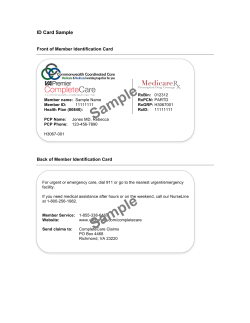
How to manage your time effectively
How to manage your time effectively Research Office gro.southwales.ac.uk How to manage your time effectively It's important that you develop effective strategies for managing your time that will enable you to balance the conflicting demands of study, leisure and work. Set Yourself Goals: Set yourself specific, clearly defined goals, which are realistic and achievable. Firstly examine your current situation and assess what goals are important to you and what action you need to take in order to achieve your target. Sometimes it seems as though there isn't enough time to do everything that you need to! One way to prevent stress from building is to identify ways in which you can improve the management of your time; you can achieve this by making small adjustments to the way in which you work, that in time will help reduce any time-related stress. Prioritise: To be effective, you need to decide what tasks are urgent and/or important and focus on those. List the tasks you have in order of priority, and then devote the most time to the most important task. This avoids the natural tendency to concentrate on the simple, easy tasks and to allow too many interruptions to your work. Differentiate also between urgent and important tasks: an urgent task may not necessarily be the most important! How to achieve effective time management • Identify and set objectives that are realistic, achievable and measurable. • Prioritise your tasks effectively; keep a diary to help manage your schedule. • Make a to-do list that will remind you of your tasks and their deadlines. • Complete work to the set deadline. • Persevere; especially when things are not working out. • Have a contingency plan. Avoid Procrastination: It is important to manage the fear of doing things you don't want to do by realising that the fear is often far worse than any possible negative results. Wherever possible make decisions immediately; because believe it or not taking action actually generates the impetus for further action. The best time to do something is usually NOW! Write a to-do List: It is useful to have a reminder system to tell you when you should do your tasks: however, don't try to remember everything in your head as this is a recipe for disaster! Carry a pen and paper or diary wherever you go so that you can write down the things you need to do, including appointments and deadlines. Breakdown your list into a more manageable list of daily tasks and update regularly by crossing off completed tasks and adding any new ones that need to be done. Urgent or important tasks can be highlighted with an asterisk. A to-do list will: • Focus your mind on important objectives. • Make you less likely to forget tasks. • Help order your thoughts. • Show the bigger picture. • Help you prioritise: the most important and the most urgent. • Make it less likely for you to become sidetracked. • Save time! Benefits of a to-do list: • Provide you a record of what you've done. • You always have something to work on. • You get the reward of ticking off your achievements. • Make you feel more in control! Break down tasks: By breaking tasks down into smaller parts it will allow you to accomplish them one step at a time. Write down each step being as specific as you can, and always try to complete a step before going on to the next. Regularly review your progress and revise your plans as appropriate taking account any unforeseen changes. To maintain your enthusiasm reward yourself for achieving your goals. Organise your time: Identify areas of your life where you are wasting time and try to reduce these. A good way to do this is to log everything you do for a week in meticulous detail and then examine your record to see how you use (or misuse!) your time. This may seem time consuming but, it will help to develop a regular work routine for the long term. Keep your work space tidy so that you can work efficiently - it's hard to do this if things you need to find are buried under a pile of paper! Work to your schedule to enable you to meet your deadlines in good time - don't leave everything until the last minute. Create a time log: 1. Make up a chart for the next seven days divided into half hour intervals starting at the time you get up and finishing at the time you go to bed. 2. Write down what you did in each half hour of the day for the next seven days. Choose a typical week. At the end of the week examine your time log and ask yourself: • Are there any periods that I could use more productively? • At what time of day do I do my most effective work? Persevere: Inevitably, things will not always run smoothly as you progress towards your goals. When things are not working out, you need to persevere and learn how to take a positive attitude. Fear of making or admitting mistakes is a major handicap to taking effective action. It is said that the people who have achieved the most have made the most mistakes!
© Copyright 2025













